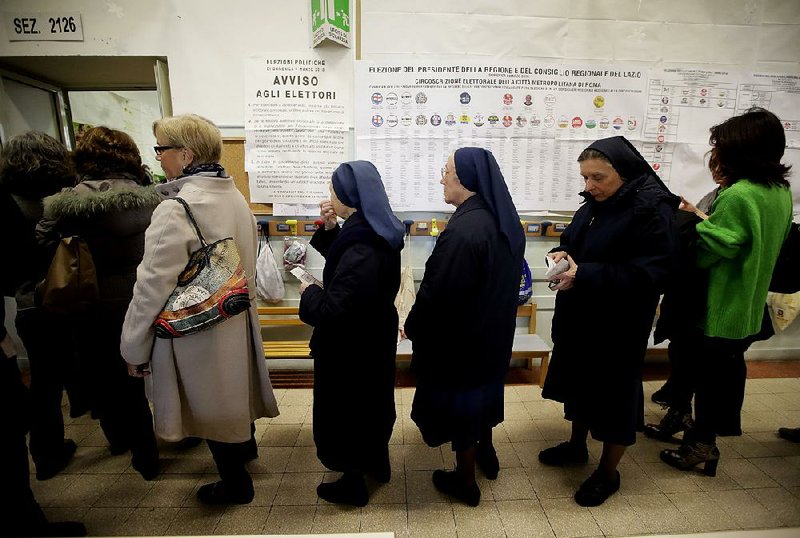ROME -- Italians on Sunday handed a majority of votes in a national election to parties that ran campaigns fueled by anger at illegal aliens.
Full results from the national election, the first in Italy in five years, are expected later today. But in early results, far-right and populist forces appeared to gain more than 50 percent of the vote.
No one party or coalition appeared to win enough support to form a government, but one thing seemed clear: Any government will be difficult to form without the insurgent 5-Star Movement, a Web-based, populist party less than a decade old that was poised to become the country's biggest vote-getter. As of early today, it was on track to win about a third of the vote.
"A triumph of the 5-Star Movement," Alessandro Di Battista, a leader of the party, said on Sunday night. "Everybody has to come talk to us."
Alfonso Bonafede, a member of Parliament from the 5-Star Movement, hailed the first exit polls at a conference room in a Rome hotel.
"The 5-Star Movement will be the pillar of the next legislature," he said.
Projections also showed big gains for the far-right League, run by Matteo Salvini. The party's roots are as a northern Italy-based secessionist party, and Salvini is notorious for having mocked southern Italians as smelling bad. But he drew on the frustration over illegal aliens to appeal to a wide swath of the country, and he has called for the expulsion of migrants and refugees.
In early projections, his party gained about 17 percent of votes -- more than the party of ex-premier Silvio Berlusconi, his coalition partner.
Italy is governed by the Democratic Party, which leads a center-left pro-Europe coalition. It was bracing early today for its poorest showing ever in a national election.
The election itself was not without problems. Some polling stations remained closed in Palermo two hours into election day because the wrong ballots were delivered, and 200,000 new ones had to be reprinted overnight. Similar ballot glitches were reported elsewhere, forcing the suspension of the vote in two towns in Alessandria province.
"I'm very worried about the situation in Palermo," Senate President Pietro Grasso, leader of the leftist Free and Equal party, was cited as saying earlier Sunday by news agency Ansa. "I hope it doesn't influence the vote."
Some of the delays may have been caused by a new anti-fraud tag attached to ballots, designed to double-check the identity of the voter. The mechanism adds an extra step to the voting process, as the head official at a polling site must detach the tag and manually write down a code.
More than 46 million people were eligible to vote, including Italians abroad who mailed in their ballots.
With unemployment at 10.8 percent and economic growth in the eurozone's third-largest economy lagging the average, many Italians have largely given up hope for change.
"The situation is pretty bad," said Paolo Mercorillo of Ragusa, Sicily, who said he would not even bother casting a ballot. "There aren't candidates who are valid enough."
A topless women's-rights activist confronted Berlusconi on Sunday, jumping on a table as he was about to hand in his ballot and displaying the message "Berlusconi, you've expired" on her bare torso.
Berlusconi, 81, turned away and was escorted out. He can't run for office until next year because of a 2013 tax fraud conviction, but he has tapped European Parliament President Antonio Tajani, considered a pro-European moderate, as his pick if the center-right is asked to form a government.
Salvini is also gunning for the top job, and some pro-European analysts envisioned a possible "nightmare scenario" of an extremist alliance among the 5-Stars, the League and the Brothers of Italy party led by Giorgia Meloni.
Berlusconi, Salvini and Meloni ran together with the idea of governing together. With their failure to reach the 40 percent threshold to claim power, it was not clear what would happen.
Steve Bannon, the conservative populist who aided Donald Trump's White House campaign, was in Rome over the weekend, cheering on the populists.
"I think if they create a coalition among all the populists, it would be fantastic; it would terrify Brussels and pierce it in its heart," Bannon was quoted as saying in Sunday's Corriere della Sera newspaper.
While others across Europe were watching the outcome of the vote for its effects on policy and markets, some in Italy had more at stake personally. Berlusconi has vowed to deport 600,000 migrants if the center-right wins -- a sentiment also endorsed by Salvini.
"I fear these results because I have arrived here with all my thoughts and dreams," said Musab Badur, an asylum seeker from Sudan who is living in a Milan shelter. "And I never thought that one day maybe I would have to go back."
Information for this article was contributed by Nicole Winfield of The Associated Press; by Jason Horowitz of The New York Times; and by Dan Liefgreen, Chiara Albanese and John Follain of Bloomberg News.
A Section on 03/05/2018

